Cooperativa School of San Pedro
Finishing up Spanish school last Friday, we can say what an amazing experience it has been, with ups, downs, feelings of inadequacy, and satisfaction in the progress we had made. After living in San Pedro for 4 weeks, we found ourselves reevaluating our perspectives about the US, ultimately realizing that we won the birth lottery by being born in a First World country. Hearing our teachers speak about their frustrations with the endemic corruption in Guatemala, i.e., government, church, businesses, made us realize just how lucky we are. As an example, three years ago money was allocated by the government to fix the road leading to San Pedro. The government had a big party celebrating the start of work, which began the next day, and two days later work stopped because the money had disappeared. Ian also had a hard time balancing conflicting thoughts:
- Knowing that we have more money and flexibility in our lives than anyone with whom we were interacting had any chance of having for their entire lives.
- We were there as students and in so doing were providing jobs for the teachers and income for our home stay family. So we were helping them in a small way by making their lives better.

As we walked away from school on Friday afternoon having participated in the graduation ceremony, we were both a little sad and relieved. We realized that mentally we were done; staying any longer we would have entered into the law of diminishing returns. To say that our brains were overloaded might even be an understatement. We learned more in four weeks of immersion than Ian had learned with multiple semesters of Spanish or Ann with a couple series of adult classes back home. But now we need to go out into the wild and practice what we have learned. Did we make the right decision to start our adventure learning Spanish with the Cooperativa School of San Pedro? Absolutely!! If we decide at some point to become expats in a Spanish speaking country, we both agree that we will be back for another month to build on this foundation. We are both happy and perhaps a bit pleasantly surprised with the progress we made.
Leaving San Pedro
We had booked a shuttle bus from San Pedro to Antigua for 11am on Saturday. Friday afternoon, the travel agency got in touch with us at our school saying that our shuttle had been rescheduled to 12pm – no big deal. Then Friday night at the school’s fogata (bonfire) party, the agency representative showed up to let us know that now instead of leaving from San Pedro, we would be leaving from Panajachel at 2pm, which required us to take a boat across the lake at 11am with all of our luggage. Making us a little nervous was that we had seen what happens with luggage: it goes on a roof which has a slight slope, without being tied down. So all that’s stopping it from taking a one-way trip to the bottom of the lake is the roof’s one inch lip.
At 10am as we bid farewell to our host family, we were all a little choked up. Then walking down the narrow streets towards the dock, getting on the boat and pulling away, we knew that we were starting a new phase. No more four hours of school, no more two hours of homework, no more three meals a day prepared for us; in other words, no cocoon. Freedom, but we had to look after ourselves, figure out places to live every few days or week. As predicted, our luggage went up on the roof. All of our electronics and medications were in our daypacks, so they would be okay; clothes could be replaced. Sure enough halfway across the lake, the boat stopped and the engine shut off. We both knew what that meant: our luggage had shifted and sure enough, the captain was up on the roof making adjustments. Luckily everything made it to the other side dry. Getting off of the boat, we got a lesson in quick versus slow thinking. A boy grabbed our bags from the roof of the boat, said to Ian very quickly a bunch of words with the word, ayudar, somewhere in the middle. The expected question was, “Are these bags yours?”, so Ian said “Si”, and a couple of seconds later he realized his mistake. We were being asked if we needed help carrying the bags which we didn’t, but by then he’d already taken off. Seven quetzales later, we got our bags back and Ian got a cheap lesson: don’t automatically say yes until making sure he understands. And the money certainly meant more to that boy than to us.
Our shuttle to Antigua from Pana was packed. Both Ann and another woman told the driver that they got carsick and needed to sit up front. The two women decided to take turns, but the driver insisted that Ann be allowed to sit in the front due to “edad”. Just another senior benefit. Ian meanwhile was in the third row with one cheek on the seat and one cheek not.
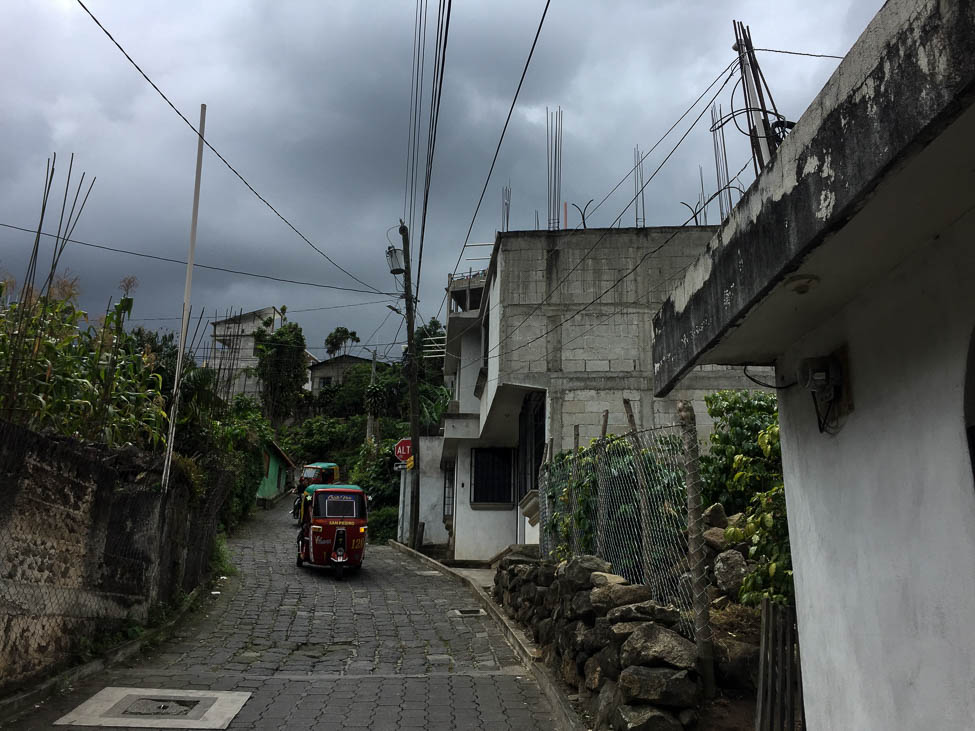
While Lake Atitlan and the surrounding lush volcano-studded landscape is beautiful (perhaps except for the unpainted, unfinished concrete block houses with the re-bar sticking up in preparation for when the owners save up sufficient money to add another floor), as we’ve hopefully conveyed in our last few posts, it isn’t a location we would consider living as expats. For us, the negatives outweigh the positives:
- It’s a good four to five hours from the closest international airport.
- For any serious illness, the closest hospitals or specialists are four hours away in Guatemala City, or three hours away in Quetzaltenango (Xela).
- The narrow streets with the noisy tuk tuks (this bothered Ian more than Ann). Every time we were walking down a street (no sidewalks), we had to be aware of them coming up behind us and had to get over quickly. Ian tried to figure out why they were so noisy and noticed that about half of them had the muffler disconnected from the exhaust pipe. Oddly enough the motorcycles were very quiet.
- The packs of stray dogs roaming the street. While we never met any that were aggressive, there was evidence of their presence on all the streets which made walking after dark a little tricky.
- Having to be extra careful all the time to not get any water in our mouths when we were brushing our teeth, taking a shower, etc.
- Finally: let’s not forget the rainy season, how cold and damp it felt a lot of the time.
Antigua
Rather than directly leave Guatemala, we had decided to spend three days in Antigua, UNESCO World heritage site #197 for its colonial architecture.

Antigua was the original capital of Central America under Spanish Rule. After an earthquake in 1717, the Spanish considered relocating the capital. Then in 1773 the city was devastated by another earthquake and the Spanish choose not to rebuild, instead moving the capital to what is present day Guatemala City.
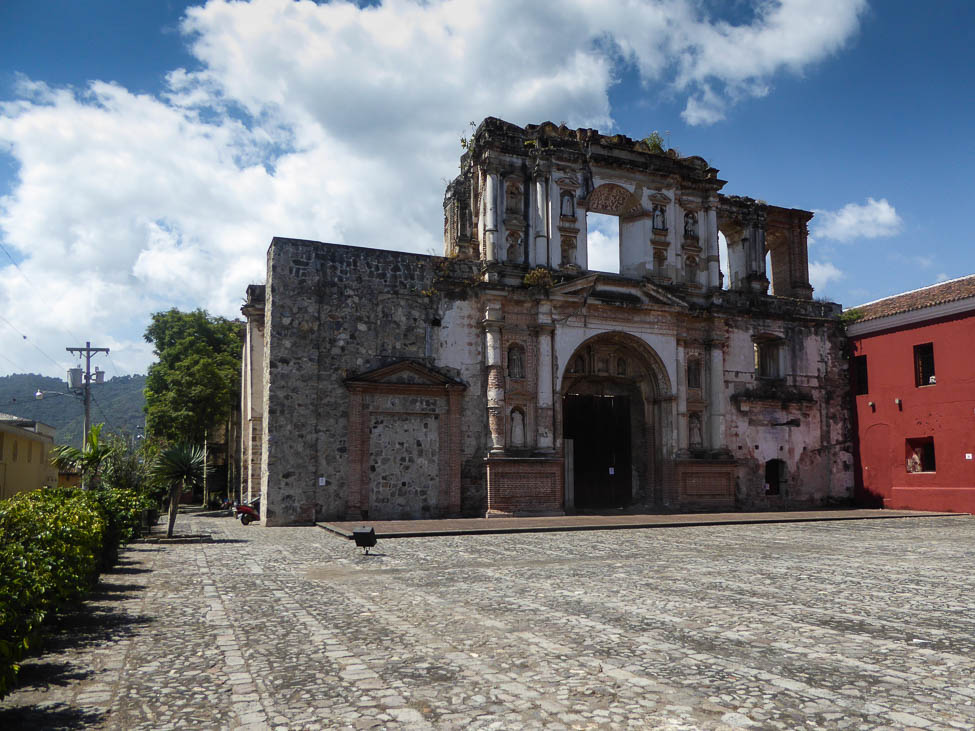
Antigua is a small city of 34000 people, very touristy, which is especially evident on weekends. But interestingly when we were there, we didn’t see many US or European tourists; most were Latin Americans, either locals from Guatemala City or others.
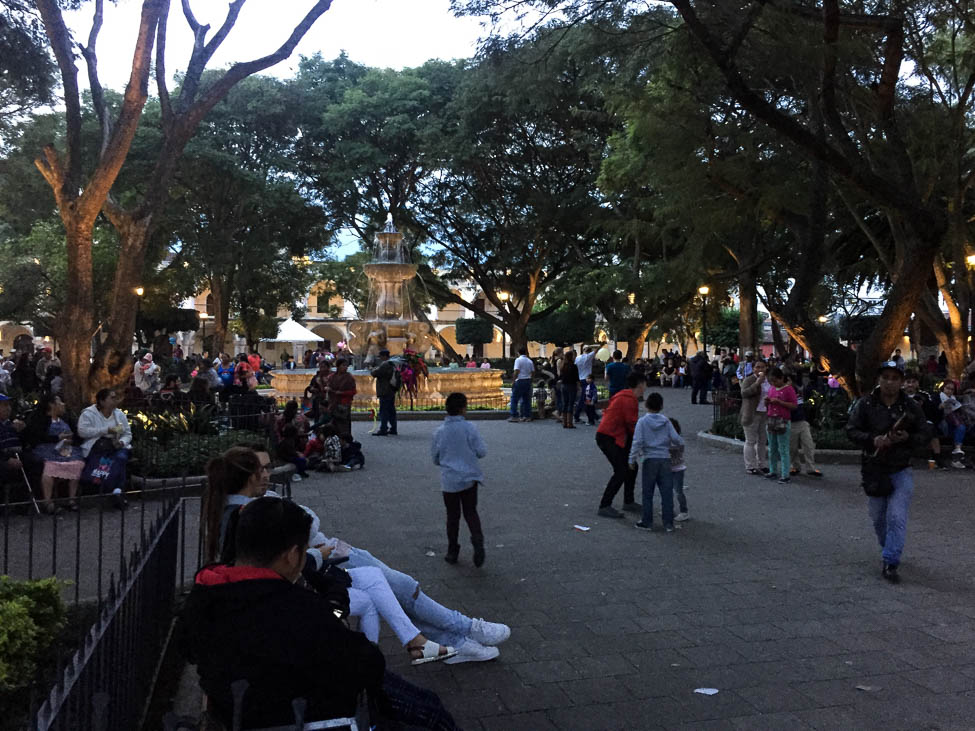
It’s a city surrounded by three volcanoes: dormant Volcan de Agua which lies to the south, dormant Volcan Acatenango on the western side, which people (not us) climb for views of the third volcano, Volcan de Fuego, which is constantly erupting and can be seen from the heart of the city puffing smoke into the sky.
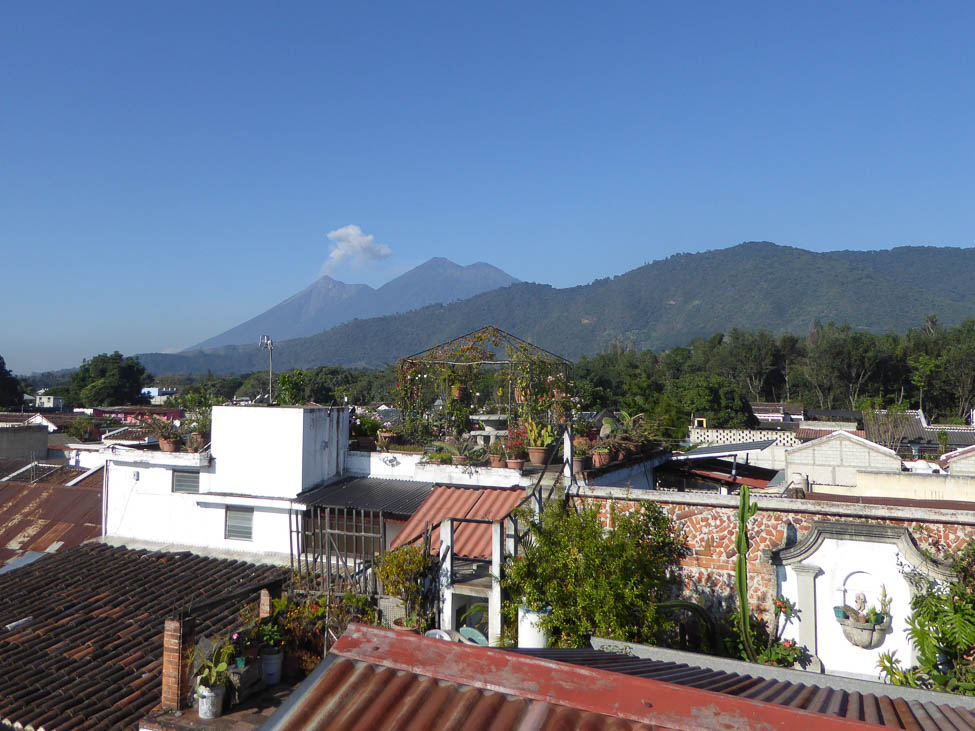
We didn’t really have specific plans for Antigua, just some relaxing downtime after Spanish school, so we spent our time playing tourist, mostly just walking around town and visiting ruins.
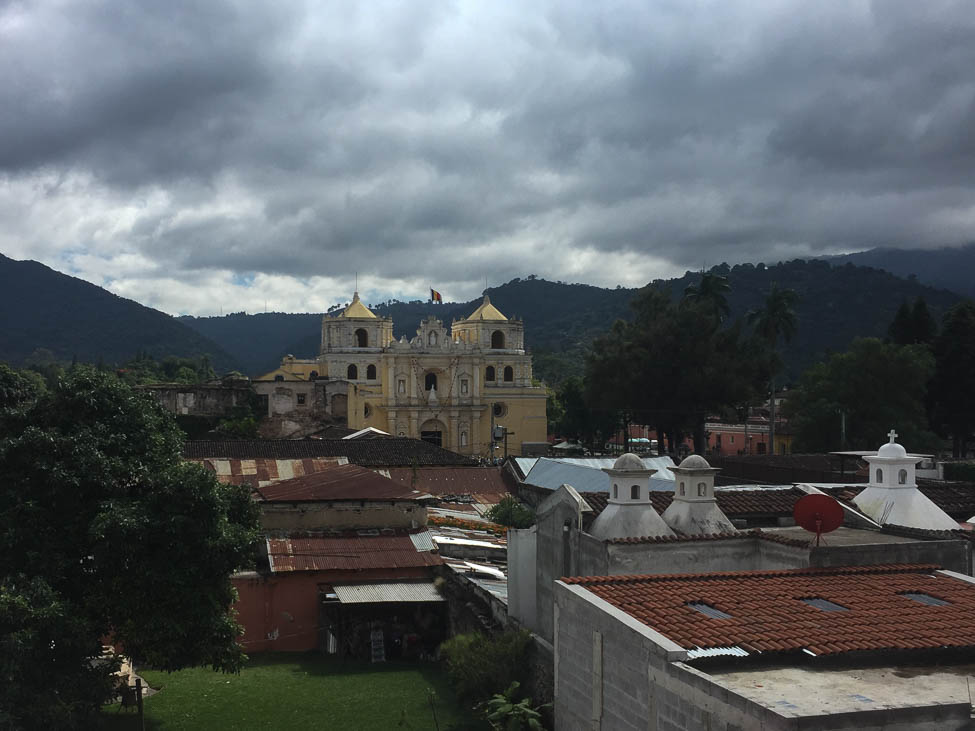
We stayed at Casa Christina , recommended by our friend, Kim, from school. It was a great choice, $33 a night for a very nice room, window, private bath, WiFi, on a relatively quiet street, right in the center of the old city. Rosario, the owner, was a joy to talk with. She filled us in on prices in Antigua, especially restaurants and real estate. And by the way, she speaks English.
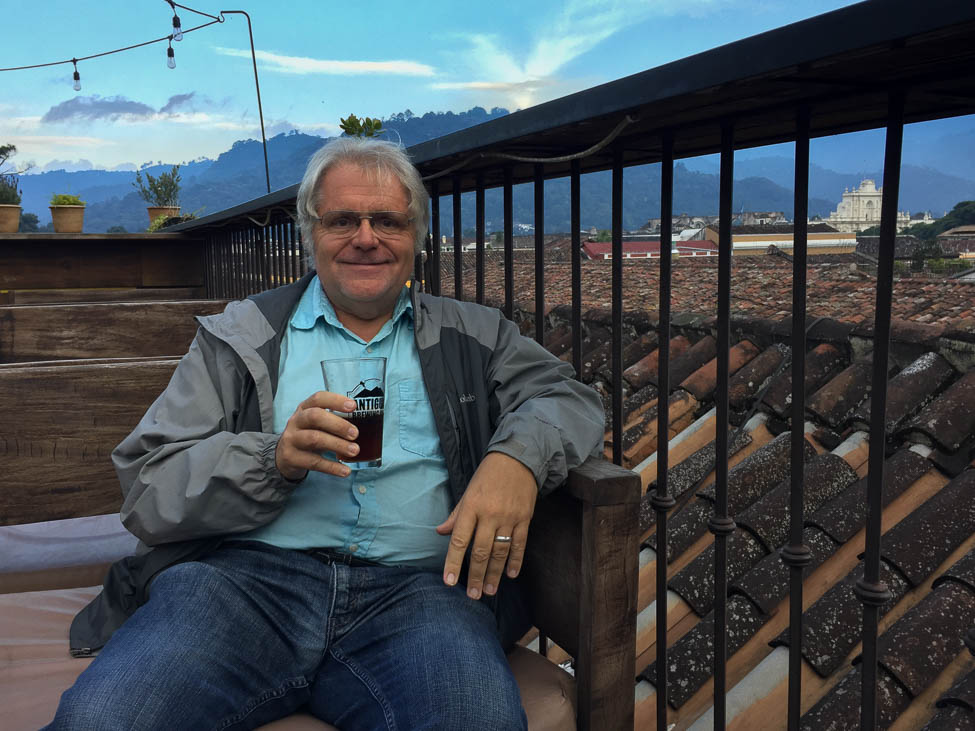
- Restaurants – Rosario instructed us to avoid any restaurants around the central park on 4th or 5th Avenue, which we did (except for ice cream one day), and while we found the restaurants more expensive than San Pedro, they were still reasonable. Surprisingly, coffee was the same price as in San Pedro. We can heartily recommend the French bakery, El Viejo Café , for pastries and breakfast. We also went to Queso y Vino , with an Italian owner. We enjoyed a wonderful margherita pizza, a pasta dish with mushrooms in a light cream sauce, and a bottle of Italian wine for $46 including tip, in a very pleasant setting.
- Real Estate – A 1 bedroom apartment in the center of town is about $800 per month, whereas outside the center, a similar apartment would rent for $200. Houses in the old center cost $500,000 and up.
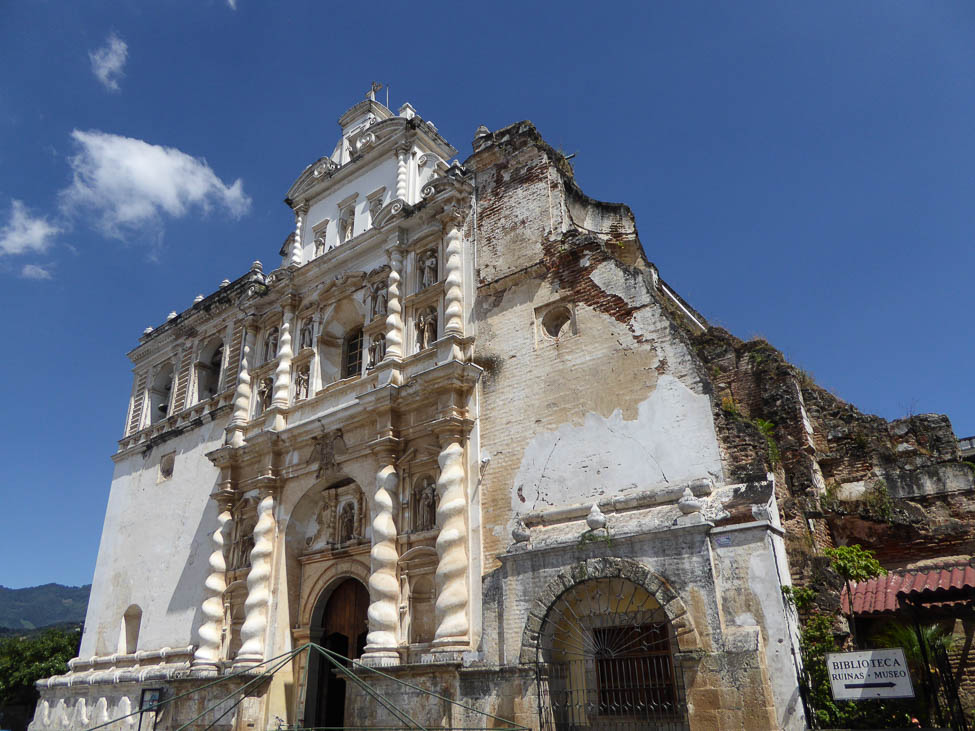
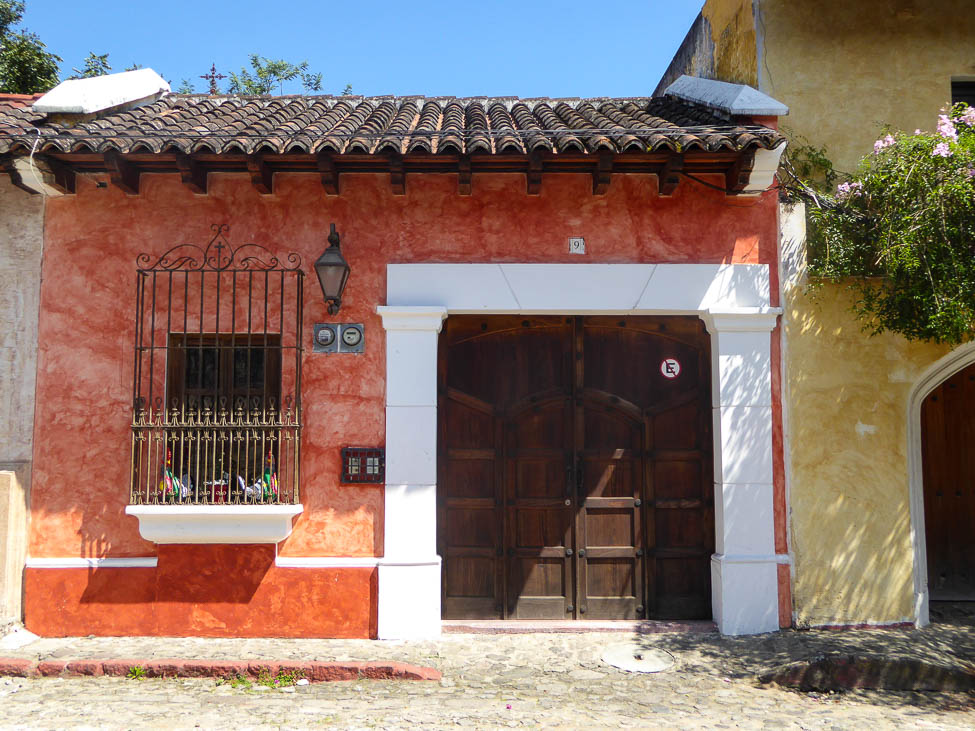
As with Lake Atitlan, as much as we enjoyed visiting, neither of us would choose Antigua as an expat destination, mostly because it’s too touristy. But we did, however, meet one Canadian expat who really seemed to enjoy his life in Antigua, and there most likely are others.
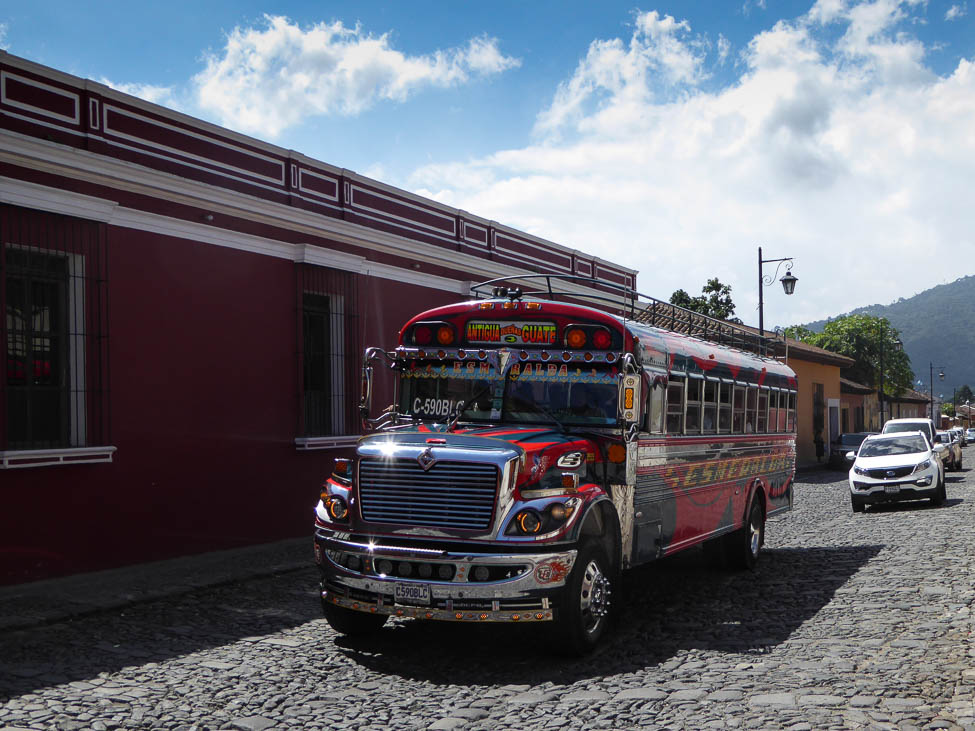
Ian & Ann

9 Comments
Again, so enjoyed your blog. I really connected to your feelings of winning the birth lottery. Same for me, I was constantly feeling grateful for being born to parents in America. Always felt it was the luck of the draw.
The decision to take a month of Spanish immersion was definitely smart. Makes me wonder if I had done the same before living in a country, would I have learned as much as you seemed to??? Somehow I doubt it as I’m terrible at languages.
Keep your blogs coming. I’m reliving through you!
Love, Karen
When I first went to Germany I was in a language school similar to what you did for two months. So I really understand leaving the safety of a controlled environment and going out into the cold reality of what is a very different country with very different social expectations.
As you know I lived as a quasi “expat” for a quarter of a century and even though I have some rich experiences and beautiful memories from that time, I always come back to Dorothy’s line in the Wizard Of Oz “there’s no place like home” (emerald slippers optional.)
Hi Bill, It sounds like maybe you had an even more challenging experience than we have, at least so far. Since we left the school, we’ve been in locations where there’s a fair amount of English spoken. Enjoying the image of you wearing the emerald slippers! 🙂
Ian & Ann
Tu escritura es tan clara e interesante y tus fotos son tan perfectas que tu blog esta igual al mejor que he visto. Seguid así. Nos sentimos casi como si estuviéramos allí contigo. Proxima tu vere a Costa Rica. No compre ninguna granjas para postes telefónicos.
Hola Art, Tu espanol es muy mejor que nuestros. Pensamos que tu nos hace apprender mas. Estamos feliz que ustedes senten casi como estuvieraron acqi con nosotros.
Ian & Ann
P.S. As always, we invite you and our other Spanish speaking friends to make corrections.
I’m saving up all your comments about Guatemala in case Steven and I decide to go for the language school. Love your insights. See you next month!
Hi Leah, If you do decide to go to the language school, we can answer any additional questions you might have. Looking forward to being with you guys next month in Colombia!
Ian & Ann
Love love your postings and look forward to each one. We were just at Worldmark Surfside Inn in ocean Park, WA and thinking a lot about you two.
I, too, think about what your friend called the birth lottery as when5we spent a year in Korea. You are certainly experiencing it.
I am very surprised at the high cost of rentals and real estate purchases.
Hi Joan, Hope you enjoyed your time in Ocean Park. Since Latin America doesn’t have an MLS like the US, the actual sale price of a property could, in fact, be a lot less than the asking price. We are guessing that less expensive rentals, especially unfurnished, may exist if one is dealing directly with the local property owner.
Ian & Ann